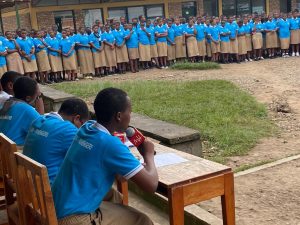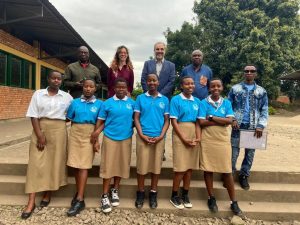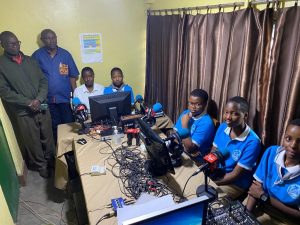UMH ESSA Ruhengeri school radio project consolidates in Rwanda
Proyectos Cooperación al Desarrollo, Ruanda
12 June 2023
The director of the ESSA Ruhengeri School in Rwanda, Faustin Niyibizi, together with its previous director, supporter of the project, and current in-situ coordinator of the UMH Headquarters in Rwanda, Jean Bassa Ngabo, hosted the Deputy Vice Rector for International Projection and Communication and associate professor of journalism, José Luis González-Esteban, along with part-time lecturer of journalism and coordinator of the volunteering program and projects at the UMH Headquarters in Rwanda, Lis Gaibar García. During their visit, the UMH representatives participated in the daytime assembly at the school with Rwandan journalist, Beni Abayisenga, and various school students addressed the evolution of the MediaLAB Club that is home to the innovative UMH-ESSA Ruhengeri school radio project that has grown and expects to continue doing so in the future.
The radio project began in summer 2019 as part of the UMH volunteering program in Rwanda. It is supported by the UMH Board of Trustees and coordinated by the Rwandan journalist, and for five years it has continued serving the educational community of the ESSA Ruhengeri public high school and implements future projects for continued consolidation and improvements.
During the visit, and the training that is part of the university development cooperation project, Educational Communication in Musanze: School Radio as a Transformational Means for Rwandan Society, which is funded by the Generalitat Valencian and its Ministry of Participation, Transparency, Cooperation, and Democratic Quality, which works to strengthen the school radio by providing improvements to its infrastructure, training the student body & faculty on radio knowhow, and by examining expansion to its emissions.
The UMH ESSA Ruhengeri school radio began its emissions with an initial group of six students (six women and one man) who had undergone three months of radio journalism training by the UMH under the coordination by the local Rwandan journalist, who has been responsible these years for coordinating content, improving the facilities, and by training new groups of students.
Included among the content by the closed-circuit radio station are programs linked to the courses taught at the high school — history, economics, chemistry, ICT — but they also address also health programs with the nursing students at ESSA Ruhengeri sharing notions related to illnesses of many kinds, including those sexually transmitted, as well as advice on their prevention, identification, and treatment. During the pandemic, the school radio served as a vehicle to transmit messages from health professions at the Ruhengeri hospital on Covid-19 prevention and measures implemented by Rwandan governmental authorities. Three days a week, in the educational assembly, the student body prepares, along with assistance from the local journalist, a news program on events at the high school, as well as local, national, and international news, which is broadcast from the school patio and listened to by the entire school community. They also hold debates in the same format.
During the years years it has operated, the school radio has trained over 30 students in different areas of knowledge of radio journalism and communication, and former DJs are now studying journalism at Rwandan universities. The small radio station has received visits by health personnel, Rwandan authorities, and by other services, such as State security forces and corps, as well as presenting commemorative events on the Rwandan 1994 genocide, among other benefits.
As for future projects, the UMH has proposed facilitating improvements to the equipment of the radio installations, as well as constructing a larger studio that can respond to school needs for the radio project. Training on radio journalism for the faculty will also be strengthened to ensure the continuity of the project, in the same way that work is ongoing that examines options for scaling up broadcasts so greater numbers of the Rwandan population benefits with these technical advances.


